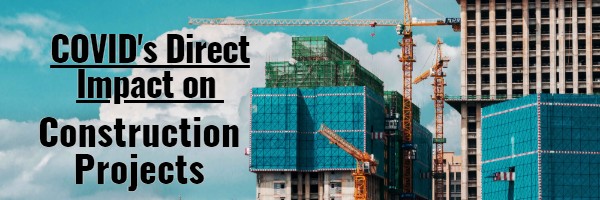It’s the year 2020 and life as we know it has changed. Everyone is constantly washing their hands. We’ve all become too familiar with the terms “coronavirus” and “social distancing”. Working remotely and e-learning for our children is now the new normal.
But what about the industries that can’t work from home? What about construction? How has that been affected by Covid-19? Are construction projects considered essential or non-essential businesses? The answer is…it all depends. It depends on your local and state governments and how they respond to this topic at their respective levels.
In the last four months, we’ve all had periods of “stay at home” orders or “safer-at-home” orders with the intent to gain control of this virus. Those orders come and go. In some states, it worked. In others, it hasn’t and the number of positive cases is still on the rise. The bottom line is that there has been no real consistency in how Covid is being handled on a National level.
Many cities and states suspended all construction in the early days of Covid-19, to halt the spread of the disease. Other cities and states deemed that only some specific projects could continue. Some then revised their suspensions again and allowed certain projects to begin – such as critical infrastructure and work on healthcare facilities. Some states have used this opportunity to make needed repairs to roadways and bridges, since traffic has been reduced. Again, there has been no consistency at all on a National level – rules seem to change from city-to-city and state-to-state.
Real Life Example
I recently spoke with a friend of mine who is a project manager currently working on a job site in Tampa, FL. I wanted to get his firsthand account of what challenges he’s facing due to Covid-19. As you can imagine, there are several factors that are negatively impacting his job site as well as the litany of new safety protocols put in place to help keep everyone as safe as possible.
The first and the biggest challenge seems to be whether your project is temporarily shut down, suspended or even canceled. Luckily, his project was just delayed. The design was already completed, but the demolition was delayed four to five weeks due to Covid. They are back to work now, but have new rules in place.
There is a nurse that takes everyone’s temperature before they’re allowed on the job site. A log is kept and anyone with a temperature of 100.4 or more is not permitted on the site. If you or any family member tests positive for Covid, you are not permitted back to the site until you and your family all test negative. This leads to being short staffed for weeks at a time which will delay a project. All contractors and sub-contractors have to go through the same procedures.
The lack of specialty workers due to illness and working on several jobs at a time will also create delays.
Production is down due to the heat and the need to stay six feet apart.
Workers are not required to wear a mask while working outside, but must wear a mask in common areas, and if they need to gather for any reason like to view and discuss a set of plans, for example.
They have rented several portable hand washing stations and have hand sanitizer available as well. They have a much bigger emphasis on keeping their hands clean now. When was the last time you washed your hands?
Also, they have ever evolving Covid-19 guidelines that are updated every four to six weeks.
Another factor negatively impacting his job site is the delay in receiving materials. My friend specifically mentioned having difficulty with receiving materials that are coming from CA, NY, TX and the biggest delay coming from overseas. In the spring of 2020, the Chinese government shut down factories leading to a decline in production. Many U.S. builders, small and large, rely on Chinese materials for their projects due to the lower cost of goods. The shutdown contributed to, and is still contributing to, the delays in U.S. projects as well as the rising cost of materials.
My friend’s project was originally scheduled to take 16-17 months but at this point he is expecting the job to take several more months than that to complete. The delays are no fault of his own, but he may end up being held responsible.
Contract Review
Because of the unexpected delays effecting almost every construction project for the foreseeable future, it would be in the best interest of design firms to review their contracts now. These unexpected delays will cost money and depending on how a contract reads, the design firm could be held responsible even if the delays were no fault of their own.
An important contract provision to review is the force majeure provision. What does it say about liability in the event of a delay related to act of a government – such as shutting down factories which in turn can cause delays in receiving needed materials? What about contract language in the event of a pandemic? No one ever thought this would be needed in a contract, but here we are today sitting smack dab in the middle of an ugly pandemic.
It’s a scary and unnerving time we are living in today, but we can all help by following the guidelines put before us and being cautious about limiting our exposure. We all want our world to get back to normal, so let’s all do our part and be safe. And wash your hands!
By Gwynne Wright, Architects & Engineers Practice Leader
[email protected] | 727.873.7920

